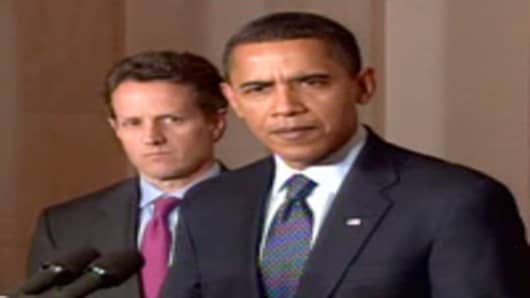You’ve probably been keeping your eye on Larry and Tim. That’s National Economic Council Chairman Larry Summers, of course—a former secretary of the Treasury and, until he ruffled many a feather, the president of Harvard University—and Tim Geithner, the current Treasury secretary, who is in the hot seat over the ever-expanding financial bailout.
But to really understand Washington’s new power structure, you need to look beyond the limelight to a group of below-the-radar appointees who will be implementing President Obama’s economic and business agendas. Whether you’re at a hedge fund, a pharmaceutical company, or an internet startup, your life will be affected by what these appointees do. The players in this unseen demographic are always hugely influential, whether because of their personal relationships with their powerful bosses or because they have more specialized knowledge than the big names about many important policy issues. But they wield unprecedented power in the new administration because these are unprecedented times. Unlike the Clinton years, when most of them previously served in government, officials at their level are dealing with issues of lasting historic significance, from reregulation of the financial system to saving what’s left of the auto industry.
Here are seven such figures to watch. A few have long-standing friendships with President Obama. At least one of them has a chance of becoming Treasury secretary someday. Another may be next in line for White House chief of staff.
They’re a diverse lot, but they all have a few things in common: Each has experience in the private sector as well as in government, and each takes an approach to problem solving that’s more coolly pragmatic than ideological, a temperament that they share with their ultimate boss.
MICHAEL FROMAN
Deputy assistant to the president
I won’t claim to be objective about Michael Froman. We met more than 25 years ago when we shared a group house in Washington. Now he is in the unique and powerful position of serving on the staffs of both the National Economic Council, run by Summers, and the National Security Council, headed by General James Jones. This puts Froman, 46, right at the crossroads of foreign policy and business. He deals directly with policy regarding trade, international finance, and the global aspects of economic recovery.
The most important thing you need to know about Froman is that he has the president’s attention, certainly as much as any other second-tier administration official. The two have known each other since they were classmates at Harvard Law School in the early 1990s. Thanks to that relationship and the nature of his White House post, he is more likely to be included in meetings with the president than some of the other agency players listed here.
Froman also has strong ties to the financial-services industry. Before joining Obama’s administration, he was in alternative investments at Citigroup, where he worked in sustainable development. He is extremely close to former Citi chairman Robert Rubin, who brought him to the company. When Rubin (who helped run Obama’s transition team) served as Clinton’s secretary of the Treasury, Froman was his chief of staff, so Froman knows how to work the agencies.
Tennis partners
Regarded as a genial moderate, Froman will most likely be a voice encouraging more trade deals and greater international cooperation on efforts to overhaul the world’s financial architecture. He’s got a shot at one day becoming Treasury secretary.
LEE SACHS
Treasury Department adviser
Sachs will be the man to see on the bank bailout, the reworking of the Troubled Assets Relief Program, and anything else having to do with keeping the economy from going over a cliff. Currently serving as an adviser at the department, he is the likely nominee for the position of undersecretary for domestic finance.
Sachs has clout. He, Summers, and Geithner are frequent tennis partners, and most years they attend a tennis camp together. (This year, they’ve had to pass because they’re a tad busy.) Sachs is regarded as “a total brainiac,” in the words of one administration insider. “Is he the most exciting guy? No,” offers another, a Washington financial policy veteran. “Does he have the Treasury secretary’s ear and attention? Absolutely.”
Sachs has private-sector financial experience with Bear Stearns, one of the poster firms for ineptitude and financial hubris. He was the youngest senior managing director in the bank’s history in the early 1990s. J.P. Morgan Chase—which bought Bear in the Wall Street equivalent of a fire sale in March 2008—hasn’t taken any government bailout money, allowing Sachs to avoid potential conflict-of-interest issues. Before the Obama gig, he was at Mariner Investment Group. As far as his government experience goes, Sachs was assistant Treasury secretary for the financial markets during the Clinton administration. He had the job of advising top officials on federal credit policies, lending, and privatization activities.
JEANNE LAMBREW
Health-care adviser
Jeanne Lambrew was Tom Daschle’s guiding muse on all things health care. She was one of his top advisers, and the two wrote a book together about health policy. Though tax issues forced Daschle to give up the chance to become secretary of health and human services, Lambrew remains very much at the center of the Obama administration’s health-care reform efforts.
Lambrew uses the Dr. honorific before her name, but she isn’t a medical doctor; she has a PhD. As deputy director of the White House health reform policy group, she wields enormous influence over the health-care plan that President Obama hopes to pass this year. Her job is to take the broad outlines of the health-care package that Obama presented during the campaign—a plan that promised to provide coverage for all 50 million Americans without health insurance—and turn it into an actual program. It won’t be easy. Presidents have been trying to bring health insurance to every American since Harry Truman was in office. But Lambrew, primarily a policy player, is also known as a pragmatist. She believes the best way to achieve universal coverage is to work in stages.
Obama has singled out Lambrew for possessing one of the traits that he finds most praiseworthy: civility. “Jeanne has a personality perfectly suited to reaching out and building consensus,” he said when he announced her appointment this past winter. “She listens. She treats people well.” Lambrew will need those skills for what lies ahead.
Meet Rahm's Rahm
GENE SPERLING
Counselor to the secretary of the Treasury
During the Clinton years, Gene Sperling was an intense, peripatetic economic aide who was famous for working into the wee hours at the White House, long after everyone else had gone home. (He once told me that vending-machine food was underrated.) Sperling began at the Clinton White House as a deputy to Robert Rubin, when Rubin served as the first chairman of the National Economic Council. After Rubin moved to Treasury, Sperling filled his seat as council chair.
A lawyer by training, Sperling was integral to all the Clinton economic initiatives of the 1990s, from the North American Free Trade Agreement to welfare reform. In that time, he became close with Geithner, then a senior Treasury civil servant. Now Sperling has returned for another stint in government, this time as a counselor to Treasury Secretary Geithner.
Sperling, now 50, is keeping less insane hours this time around, but his level of influence has held steady. As a counselor to Geithner, he’s Treasury’s representative on virtually all issues but the bank bailout—including the budget, health care, and autos.
JULIUS GENACHOWSKI
Nominee for Federal Communications Commission chairman
Heading the FCC isn’t as glamorous as becoming a cabinet secretary, but as chairman of the commission, Genachowski will be an important voice in how telecoms, television, and, increasingly, the internet are regulated. Before being nominated for the chairmanship, Genachowski, 46, was the general counsel and chief of business operations at IAC/ InterActiveCorp, where he was a consigliere to Barry Diller, helping the legendary mogul acquire such companies as LendingTree as well as other internet properties. Before that, he was a Supreme Court clerk to not one but two justices, William Brennan and David Souter. And yes, he was a Harvard Law School classmate of Obama’s as well, with the added advantage of being a strong hoops player despite his diminutive height. (Disclosure: Genachowski is also a friend of mine.)
Genachowski, who was chief of staff to Clinton FCC chairman Reed Hunt in the 1990s, favors net neutrality, the position that the government shouldn’t permit internet-service providers to give priority to one kind of internet traffic over another. That’s a stance favored by the likes of Google, whose CEO, Eric Schmidt, has been an informal Obama adviser since last year. But net neutrality is something that the telephone companies oppose. Genachowski will have his hands full.
MONA SUTPHEN
Deputy White House chief of staff
Everybody has heard of Rahm Emanuel, the president’s chief of staff and the Obama White House’s tough enforcer. Sutphen is Rahm’s Rahm, the deputy who has to make sure that the trains run on time and ensure that the White House is truly a smooth-running machine.
A former special assistant to Samuel Berger, Clinton’s national security adviser, Sutphen, like Emanuel, knows about more than political maneuvering. She has been a foreign-service officer and is fluent in five languages, including Mandarin. Her time as a managing director at Berger’s consulting firm, Stonebridge International, helped cement her ties to foreign leaders.
Like Obama, Sutphen, 41, has a black father and a white mother. She is also the author of a book, The Next American Century: How the U.S. Can Thrive as Other Powers Rise, in which she argues that the United States should cooperate more with other countries and dictate less.
Sutphen will play a major role in formulating foreign and economic policy. If Emanuel moves on at some point, Sutphen could well find herself in his seat as White House chief of staff.
LAEL BRAINARD
Likely nominee for undersecretary of state for economic affairs
Most people don’t think of the State Department as a hotbed of economic policy. But the work of diplomacy increasingly involves economics and business, and besides, Secretary of State Hillary Clinton is not about to sit on the sidelines and let the Treasury Department handle such issues as Chinese currency manipulation or Colombian trade policy.
To help her claim her turf, Clinton is likely to turn to Brainard, a seasoned Washington hand and Clinton loyalist. Brainard, a former McKinsey & Co. consultant who cooled her jets at the Brookings Institution during the Bush years, was a Clinton supporter and donor in the 2008 primaries. She is a veteran of the National Economic Council, where she worked under Gene Sperling during Bill Clinton’s presidency and had the portfolio for international-finance issues. Her past relationship with Sperling, now at the Geithner Treasury, could come in handy in the Obama administration. She could be an essential figure at all the gatherings of heads of state in the coming years.
Brainard and her husband, Kurt Campbell, who was in the Clinton Defense Department, are among Washington’s most plugged-in players. (Campbell is now director of the Aspen Strategy Group, a branch of the Aspen Institute, and CEO and co-founder of the Center for a New American Security, a think tank.) At a time when international economics matters more than ever, their $1.8 million home in Chevy Chase, Maryland, will become an important salon. Brainard could end up as the U.S. trade representative before the end of Obama’s presidency.



